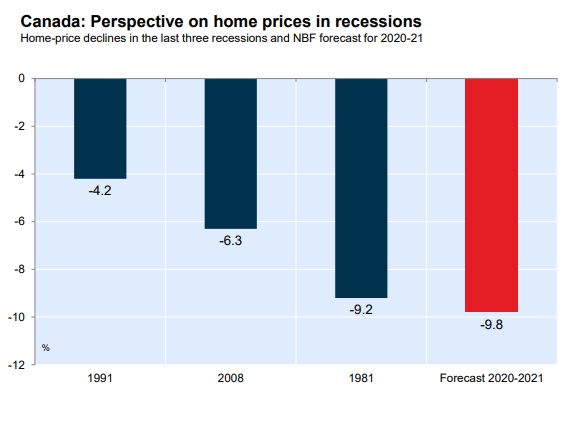 https://img.huffingtonpost.com/asset/5ee53b6f240000f1198eca5a.jpeg?cache=WOSTsi5yMa
https://img.huffingtonpost.com/asset/5ee53b6f240000f1198eca5a.jpeg?cache=WOSTsi5yMa
ACH-DP via Getty ImagesHigh-rise condo towers at Humber Bay Park in the Toronto borough of Etobicoke. House prices in many parts of Canada are rising amid the pandemic, even as rental rates drop.
MONTREAL ― The COVID-19 lockdowns have exposed a divide in Canada’s job market, with low-income earners getting hit much harder than high-income earners in the wave of layoffs that has taken place since March.
Now that divide is making itself felt in the housing market. As those on the lower rungs of the income ladder struggle to make rent, middle and higher-income Canadians are jumping back into the housing market.
The result? Rental rates rates are falling steeply across Canada, even as the housing market shows signs of life, with prices even rising in some markets.
WATCH: Plunge in sales, low inventory, high prices: Economist on the spring housing market. Story continues below.
Rental rates across Canada have fallen for three straight months and are down 7.8 per cent, on average, from before the pandemic, rental site Rentals.ca reported this week.
“Tenants have been more dramatically impacted by pandemic-related job loss than homeowners, and are not currently looking for apartments or other rental accommodation,” Bullpen Research president Ben Myers said in a statement. “This sharp drop in demand has resulted in landlords dropping their asking rents in most major markets across the country.”
Rentals.caRental rates have come down in many municipalities, according to this chart from Rentals.ca, with Victoria, B.C., and suburban cities in Greater Toronto leading the way.
Larger cities have been hit particularly hard. Rents per square foot have dropped steeply in Toronto since the pandemic and are now 9.5 per cent below their levels from a year ago, Rentals.ca reported.
Average asking rents jumped 3.8 per cent in May in Vancouver in May, but on a per square foot basis, condo rents fell 2.4 per cent in May, and are 5.4 per cent lower than a year ago, Rentals.ca said.
House prices rising in many markets
It’s a different story in the housing market, where real estate agents say they are seeing a sharp pick-up in activity since lockdowns started lifting. Buyers and sellers have become more comfortable with virtual tours and with social distancing measures taken during viewings, they note.
Many people pulled their houses off the market during the lockdowns, and as buyers come back, pressure is building on the market.
“The story lately has been a lack of overall inventory,” Toronto real estate Doug Vukasovic wrote in a recent report looking at the local housing market.
“For the year to date, a downward trend in pricing has already been corrected. … Even now, most properties are ripe for bidding wars, and many are getting snatched up within a few days of their being listed.”
Will the barrier break?
But the divide between the rental and housing markets could soon break down. That’s because a significant chunk of Canada’s homes, particularly condos, is in the hands of investors who rely on the rental market to pay their mortgages.
That could be a problem, especially for those investors who bought their properties in recent years at high prices. A recent report from TorontoRentals.com found that units in many of Toronto’s new condo buildings are losing money at current rental rates.
Some experts have warned that if this continues long enough, it could lead to forced selling in the housing market, driving up the supply and pushing down prices.
That could also happen if tourists don’t return to Canada’s cities, economists at National Bank of Canada wrote in a report at the end of May.
“Tourism is likely to be slow for some time, and the possibility cannot be excluded that lodgings currently marketed to tourists on short-term-rental platforms such as Airbnb will be put up for sale for lack of revenue,” economists Matthieu Arseneau and Alexandra Ducharme wrote.
Arseneau and Ducharme are forecasting a 10-per-cent drop in the Teranet house price index over the next year, which would make it the steepest one-year drop in Canadian house prices in decades.
National Bank FinancialEconomists at National Bank of Canada predict a steeper house price decline in this downturn than in the previous three recessions.
Among major cities, the National Bank economists predict that Toronto will see the steepest price decline, with its price index dropping 13 per cent.
House prices will also fall in Vancouver (down 12 per cent), Calgary (down 10 per cent) and Montreal (down 7 per cent), they forecast.
However, prices could fall more than that if immigration to Canada comes in below expectations after the pandemic, Arseneau and Ducharme wrote. Immigration has fallen after three of the past four recessions, they noted.
They also noted that prices could fall further than expected if Canada Mortgage and Housing Corp. (CMHC) tightens standards for mortgage insurance.
Days after the report came out, CMHC did just that, tightening the standards for the maximum amount of debt borrowers of insured mortgages can carry.
Experts estimate the change will reduce the maximum purchase price for a home with an insured mortgage by up to 12 per cent. Canada’s two privately-run mortgage insurers, Genworth and Canada Guaranty, have said they will not follow the CMHC’s move.

